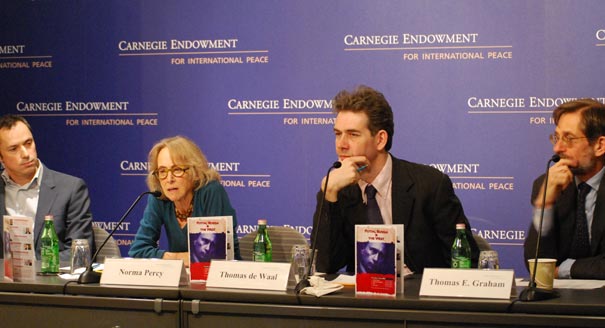Registration
You will receive an email confirming your registration.
IMGXYZ3644IMGZYXIn August 2008, Russia and Georgia went to war and the United States became involved in its gravest confrontation with Moscow since the end of the Cold War. “War,” the third part of the BBC Two series Putin, Russia, and the West, covered the outbreak of the conflict through interviews with key players in the drama, including Georgia’s President Mikheil Saakashvili, Russian Foreign Minister Sergei Lavrov, U.S. Secretary of State Condoleezza Rice, and Secretary of Defense Robert Gates.
Carnegie hosted a screening of “War,” followed by a discussion with the producers of the series, Norma Percy and David Alter, and Thomas Graham, former Director for Russia in the National Security Council until 2007 and now with Kissinger Associates. Carnegie’s Thomas de Waal moderated.
- About “War”: Putin, Russia, and the West is the latest in a series of documentaries made by the UK company Brook Lapping which reconstruct “contemporary history through the voices of people who lived it,” explained Percy.
- Accuracy: Graham stated that the movie “captured the personalities well” and described some of the key issues, such as the disputes over missile defense and NATO expansion, in a free and fair fashion. Kosovo played an important role in the thinking of Russian and Georgian leaders in the lead up to the war and its aftermath, Graham said. However, the film’s coverage of Kosovo could have been more in depth.
- The Ossetian Factor: Graham also noted that the movie did not represent South Ossetian or Abkhaz views on the war. The United States had little to no ties to South Ossetia or Abkhazia before the war. Washington assumed the two breakaway regions were pawns of Russia, and thus lost the opportunity for closer diplomacy and for “not treating these regions as separate actors,” added Graham. As the recent presidential elections in Abkhazia and South Ossetia demonstrate, these regions do have views that are different from Russia, he asserted. Alter explained that the film-makers had recorded interviews with Ossetian officials but had not found a way of incorporating them in a relatively short film.
- Debate on U.S. Messages to Georgia: Prior to the 2008 war, the United States had very extensive contacts with Georgia, said Graham. “Russians could be forgiven for thinking that we are much closer to Georgia than we would have liked to portray in public.” David Rakviashvili of the Georgian embassy said that new information had come to light since the making of the film. He said the question of why the United States had not come more to the aid of Georgia was a relevant one, asking “Why not?” In response to a question about whether Saakashvili’s move was a “gamble,” Percy quoted the Georgian president in the film saying, “hopefully the international community would wake up and see – we concentrate efforts, we get some kind of reversal.”
